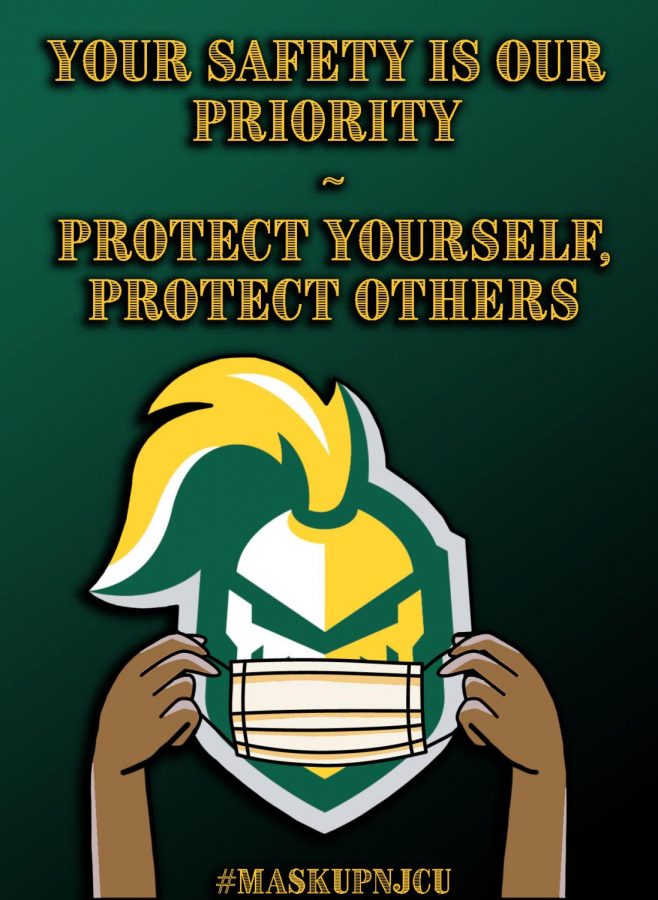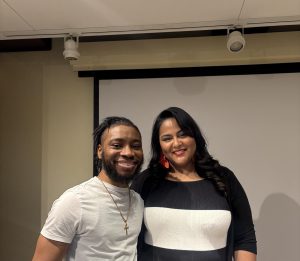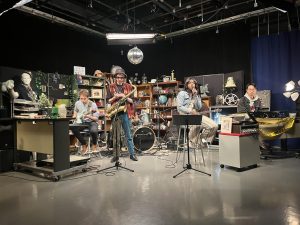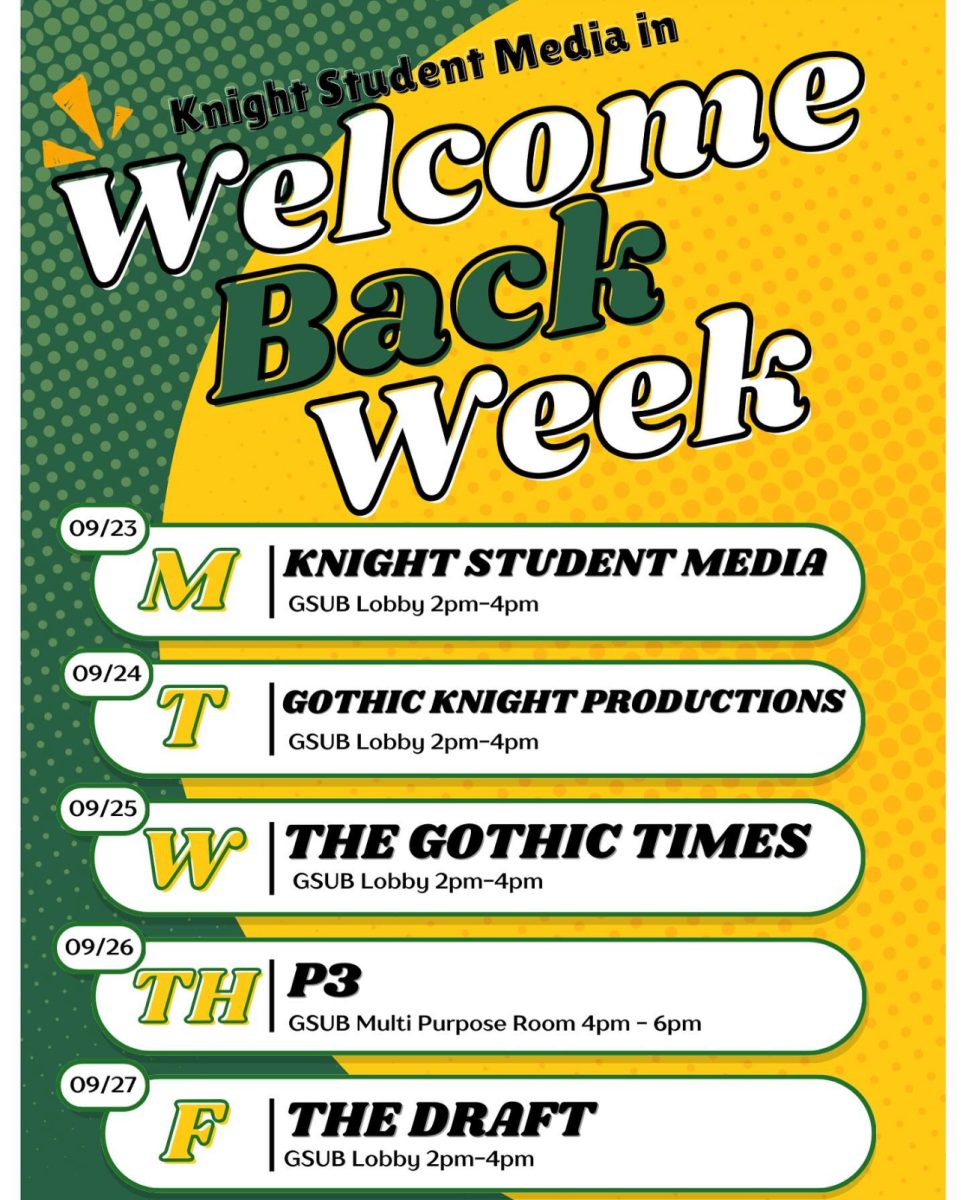Confusing Communication about Vaccine Mandate as Classes Begin
A flyer seen throughout the NJCU campus. Created by Gia DeMonaco.
September 14, 2021
NJCU announced a vaccine mandate for all students in April but a week before classes began, the policy changed.
Unvaccinated students are allowed to attend in person if they get their first vaccination dose by September 17. They would need to have their second dose by October 8, according to the NJCU policy. They also need to be tested once a week.
At about 10:30 pm on August 31, the day before classes started, many students whose vaccine status was unverified received an email saying that they would be excused from attending classes in person for the first week (until 9/7) and that their professors were notified.
Many faculty members are not happy with non-vaccinated students being allowed in their classrooms.
Barbara Hildner, president of the American Federation of Teachers (AFT) Local 1829 union and professor in the English department, said, “The recent change in the vaccination policy makes the campus community less safe. The administration has taken some steps to protect the campus community but needs to go further. One step is for the administration to support faculty as they decide whether to teach their classes online or in-person.”
Hildner also said, “Like Rowan University, NJCU should inform the full campus community each week concerning the number and percentage of unvaccinated students and also other personnel who are on campus.”
A quick search online shows that Saint Peter’s, Montclair, Kean, Rutgers, and Princeton require students to be vaccinated unless they have a medical or religious exemption. NJCU also has this exemption in place.
Part of the confusion is that NJCU said if students were not vaccinated, they could not attend the first week of classes.
It is still not clear what will happen to students who may refuse to get vaccinated. Jodi Bailey, vice president for student affairs, explained in an email interview that the university is still deciding on what will happen to unvaccinated students by the October 8 deadline but that NJCU is committed to returning to in-person instruction.
Bailey said, “We are still making decisions about the next steps as October 8th approaches. We as a university do not want to be punitive about the vaccinations as we fully understand there are real issues regarding medical mistrust within our community. However, it is also vitally important that we have an in-person, vibrant campus where we come together. A multitude of data and student development theories emphasize the importance of students being face to face with faculty, peers, and a part of the overall university community. The more connected students are to campus, the more they persist, retain and graduate. Our institution’s mission is about offering an excellent education to a diverse community. We will not be supporting the mission of the institution if we are not face-to-face. To do this, we need to be vaccinated.”
When asked how the first week went from the perspective of the NJCU administration, Bailey said, “All in all, we are incredibly proud to be able to offer in-person instruction to our students. It has taken countless hours on behalf of the NJCU staff to get us to this fall, and I am amazed at the work they have done. There have been issues, especially because there has been vaccination hesitancy in our community. We needed to make last-minute adjustments to allow all of our students to receive their education. All of this is new, so there are challenges, but we figure it out much as we have since the start of COVID. NJCU is proud to say that we have never closed the residence halls or stopped food service.”
Thyquel Halley, president of the Student Government Association, said, “On a national scale there is a divide between the vaccinated and the unvaccinated. This is evident in our local communities and here at NJCU. Everyone has personal opinions that should be respected. I have spoken to different students at NJCU regarding their thoughts and their concern is with the effectiveness of the vaccine more than NJCU’s mandate. What I have heard is students being happy with submitting medical and religious waivers to be exempt from this policy. It’s all a personal choice and the only thing to blame here is the virus itself.”
The Center for Disease Control (CDC) says the vaccine “protect[s] people from getting infected and severely ill, and significantly reduce[s] the likelihood of hospitalization and death.” The U.S. Food and Drug Administration (FDA) gave the Pfizer-BioNTech COVID-19 Vaccine full approval in late August.
NJCU is offering vaccinations on campus in GSUB every Tuesday and Thursday.
A Mostly In-person Fall Semester
Students reported that a few professors held classes online the first week instead of in person. Some classes were held in a hyflex model to accommodate students whose vaccine status was unknown. At least one student told us that their class was canceled for the first day due to their professor being ill.
Provost Tamara Jhashi explained in an email interview that whether classes are online or in-person is decided in advance. She said, “Class modalities are generally identified well in advance – for example, scheduling for Fall 2022 courses will begin this October. From March 2020 through Summer 2021 we were in online mode primarily to address the global pandemic. As we prepared for fall semester 2021 prioritizing in-person classes was key for a successful resumption of operations.”
Jhashi said that professors shouldn’t change their courses: “For a class that is listed as online, it would be inappropriate to change the modality to in-person – students arrange work-and home-schedules and responsibilities based on those published modalities.”
Department chairs and instructors decide on the setting of classes based on what is best for the program, according to Jhashi.
NJCU decided to have a mostly in-person fall semester since vaccines became more readily available in the months prior. Jhashi said, “With the wide availability of vaccines to combat the pandemic all spring and summer, we looked forward to welcoming students to a college experience once again on our campus. Students who spent a year on Zoom are now able to enjoy being with their peers and professors, and resume the life of the university. The vaccination rates have been somewhat disappointing but have improved even in the last few weeks. Nationally, most every institution has resumed an in-person fall term, and as someone who has been on campus since August 2020, I can’t tell you how wonderful it is to see students on campus, interacting with each other and engaged in learning.”
Mask Mandates and Classroom Concerns
Joseph Moskowitz, professor of Political Science, said, “[I am] particularly concerned about the numerous adjustments of policy when it comes to COVID and I urge faculty, students, and staff to set good examples and to WEAR their masks. Unfortunately, that has not been the case during the first week of the Fall semester.”
Max Herman, professor of Sociology, said that there are still a lot of students who are not vaccinated. He said, “approximately 30% remain unvaccinated and are attending in-person classes, which puts faculty, students, and staff at risk.”
Ellen Quinn, a professor from the Art department, said, “[We are] dealing with a virus that keeps changing, and the biggest concern is how we are planning. One of the problems is transparency.” She also added, “Administration is not in class. Why do you [the administration] not want more important input?”
According to Associate Professor of the English Department, Chris Cunningham, “NJCU has few instructional spaces that allow for the recommended social distancing.”
Cunningham also said, “It is too bad that more online sections were not created to accommodate unvaccinated students.”













